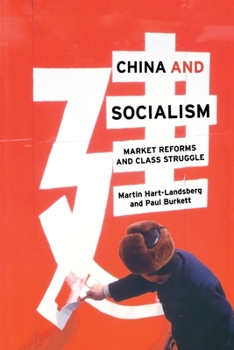China and Socialism: Market Reforms and Class Struggle
Select Format
Select Condition 
Book Overview
China is the fastest-growing economy in the world today. For many on the left, the Chinese economy seems to provide an alternative model of development to that of neoliberal globalization. Although it is a disputed question whether the Chinese economy can be still described as socialist, there is no doubting the importance for the global project of socialism of accurately interpreting and soberly assessing its real prospects.
China and Socialism...
Format:Paperback
Language:English
ISBN:1583671234
ISBN13:9781583671238
Release Date:March 2005
Publisher:Monthly Review Press
Length:128 Pages
Weight:0.45 lbs.
Dimensions:0.4" x 5.6" x 8.0"
Customer Reviews
3 ratings
Review from Branddenotes.blogspot.com
Published by Thriftbooks.com User , 15 years ago
While the Chinese government has done an excellent job in raising the country's GDP using protectionist techniques similar to the East Asian Tigers, this book delves into the cost of such economic growth. For instance, while wages have gone up (highly unevenly), health care that used to be provided for free (and so wouldn't be reflected in wages) is now very difficult to come by for the mass of Chinese. The heart of socialism - full provision of education, food, housing, medical care - has been eviscerated by Chinese leaders in Deng's mold who think that capitalist economists are the true scientists, and their advice can be relied upon to generate wealth. Wealth which one day may be more evenly redistributed, someday in the future. Someday in the future, of course, we will all be dead.
Important, limited, account of China's transition to capitalism
Published by Thriftbooks.com User , 18 years ago
In this book, Burkett and Hart-Landsberg set out to explain how the Chinese economy is characterized by full blown capitalism, how it got this way, and why this economy should not be viewed favorably by leftists. They successfully show that a full blown capitalist system exists in China. I was unaware that any informed people thought otherrwise, but apparently they do. They probably go a bit too far in describing the extent to which China's collectives and SOE's are only so in name, but the gist is certainly correct. The best part of their book is the description of how full blown capitalism arose in China. They choose not to focus on the desire of the Chinese leadership to establish full blown capitalism. they show how small reforms created contradictions that necessitated more reforms. Thus, capitlaists reforms went further than the leadership initially desired. Of course, the lack of discussion of the leadership's bias towards capitalism is a problem because it is necessary to explain why the original capitalist reforms were made in the first place, and why the direction taken to resolve the problems of the reforms was towards further liberalization rather than the repeal of the reforms themselves. The discussion of the performance of the Chinese economy is quite sound, and is from a Marxist perspective. It examines Chinese development in the context of uneven development throughout the world or region, and also the increase in misery amidst wealth. The book is good overall, but in addition to the limitation mentioned above, there are some other problems. The book is short (the main body of text is around 115 pages) and it would've been better had it gone into a bit more depth. I disagree with some of their observations (mostly unrelated to their general conclusions). The agricultural miracle of the early 1980s and late 1970s had less to do with decollectivization or state price support. Rather, it was mainly a result of development of agricultural technology and infrastructure in the late Maoist era (See Chris Bramall's book "Sources of Chinese Economic Growth: 1978-1996).
An informed and informative descriptive analysis of Chinese capitalism as practiced today
Published by Thriftbooks.com User , 18 years ago
In China And Socialism: Market Reforms And Class Struggle, co-authors Martin Hart-Landsberg (Professor of Economics, Lewis and Clark College, Portland, Oregon) and Paul Burkett (Professor of Economics, Indiana State University) provide the non-specialist general reader with an informed and informative descriptive analysis of Chinese capitalism as practiced today. Chapters cover China's economic transformation, as well as contradictions both domestic and international to this transformation. Tables, figures, and a wealth of research back the history, theories, and projects with solid data. A "must-read" especially for political scientists, economists, and businessmen seeking to better understand the changes that continue revolutionize China's economic model to this day.





